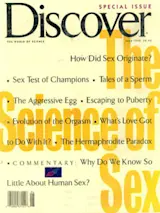Frankly, I suspect that if there had never been sex, life would have been stuck at the single-cell level. So I am assuming that for some reason sex has been abolished. The conscious mind boggles at the possibilities and ramifications. Therefore, I am reporting on what my unconscious had to say about this a few years ago.
I had a dream once when I was writing about orangutans. It was set in the future (somehow I knew that), and I was all keyed up in a fantastic state of expectation. It was that time of month, and I was about to have a week’s leave from work to go to the hotel. This was the time everyone lived for, the frosting on a very workaday cake. The world had achieved peace, at a price, and the price had been so apparently cheap. The solution to the problem of human aggression ...














